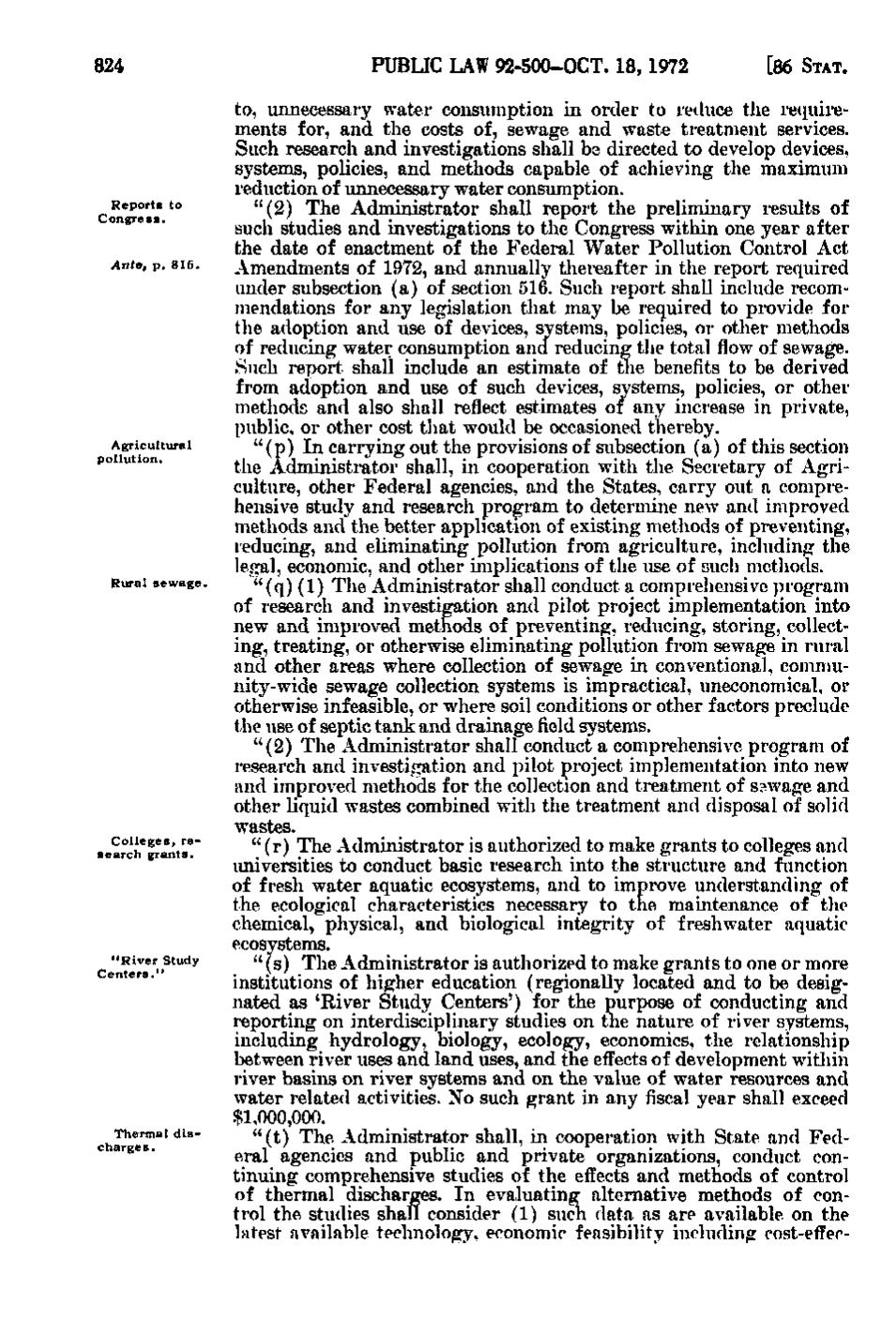824
Reports to Congress. Ante, p. 816.
Agricultural pollution.
Rural sewage.
Colleges, research grants.
"River Study Centers."
Thermal discharges.
PUBLIC LAW 92-500-OCT. 18, 1972
[86 STAT.
to, unnecessary water consumption in order to reduce the recjuirements for, and the costs of, sewage and waste treatment services. Such research and investigations shall be directed to develop devices, systems, policies, and methods capable of achieving the maximum reduction of unnecessary water consumption. "(2) The Administrator shall report the preliminary results of such studies and investigations to the Congress within one year after the date of enactment of the Federal Water Pollution Control Act Amendments of 1972, and annually thereafter in the report required under subsection (a) of section 516. Such report shall include recommendations for any legislation that may be required to provide for the adoption and use of devices, systems, policies, or other methods of reducing water consumption and reducing the total flow of sewage. Such report shall include an estimate of the benefits to be derived from adoption and use of such devices, systems, policies, or other methods and also shall reflect estimates of any increase in private, public, or other cost that would be occasioned thereby. " (p) In carrying out the provisions of subsection (a) of this section the Administrator shall, in cooperation with the Secretary of Agriculture, other Federal agencies, and the States, carry out a comprehensive study and research program to determine new and improved methods and the better application of existing methods of preventing, reducing, and eliminating pollution from agriculture, including the legal, economic, and other implications of the use of such methods. " (q)(1) The Administrator shall conduct a comprehensive program of I'esearch and investigation and pilot project implementation into new and improved methods of preventing, reducing, storing, collecting, treating, or otherwise eliminating pollution from sewage in rural and other areas where collection of sewage in conventional, community-wide sewage collection systems is impractical, uneconomical, or otherwise infeasible, or where soil conditions or other factors preclude the use of septic tank and drainage field systems. "(2) The Administrator shall conduct a comprehensive program of research and investigation and pilot project implementation into new and improved methods for the collection and treatment of sawage and other liquid wastes combined with the treatment and disposal of solid wastes. " (r) The Administrator is authorized to make grants to colleges and universities to conduct basic research into the structure and function of fresh water aquatic ecosystems, and to improve understanding of the ecological characteristics necessary to the maintenance of the chemical, physical, and biological integrity of freshwater aquatic ecosystems. " (s) The Administrator is authorized to make grants to one or more institutions of higher education (regionally located and to be designated as 'River Study Centers') for the purpose of conducting and reporting on interdisciplinary studies on the nature of river systems, including hydrology, biology, ecology, economics, the relationship between river uses and land uses, and the effects of development within river basins on river systems and on the value of water resources and water related activities. No such grant in any fiscal year shall exceed $1,000,000. " (t) The Administrator shall, in cooperation with State and Federal agencies and public and private organizations, conduct continuing comprehensive studies of the effects and methods of control of thermal discharges. In evaluating alternative methods of control the studies shall consider (1) such data as are available on the latest available technology, economic feasibility including cost-effec-
�
